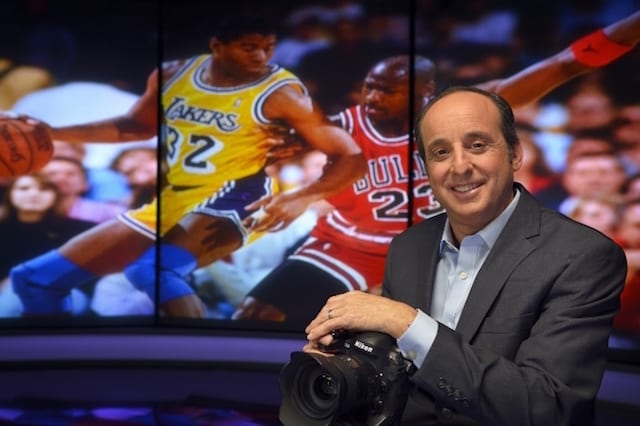As teammates and coaches around Kobe Bryant changed during his 20 seasons spent with the Los Angeles Lakers, there was one constant. From Bryant’s first Lakers Media Day to the final game of his illustrious career, legendary photographer Andy Bernstein was there to document it.
Bernstein is the official team photographer and also holds the position of director of photography for Staples Center and Microsoft Theater L.A. Live.
His longstanding tenure with the Lakers has overlapped with that of some of the game’s greats: Kareem Abdul-Jabbar, Magic Johnson, James Worthy, Shaquille O’Neal and Bryant, among others.
Beyond his unrivaled talent as a photographer, Bernstein is renowned for his ability to develop a positive rapport with his subjects. It’s a layer to capturing moments that otherwise may not have become so iconic.
While Bernstein has shared a bond with several current and former athletes, perhaps none is stronger than a friendship with Bryant. Twenty years of photographing the Lakers legend culminated with the two coming together on “The Mamba Mentality: How I Play.”
The relationship between Bernstein and Bryant began in improbable, if not remarkable, fashion. “We bonded the very moment that I met him on my set at Media Day 1996,” Bernstein recalled in an interview with LakersNation.com. “He’s an 18-year-old rookie and like on any Media Day, there’s a lot going on.
“He finally comes to my set, and like any other player I haven’t met — rookie, a traded guy, whatever — I’ll go and introduce myself. I walk up to him and say, ‘Kobe, I’m Andy Bernstein. Your Lakers team photographer.’ He looks me right in the eye, still shaking my hand and goes, ‘I know who you are.’ And I said, ‘How is that possible? We never met?’ He said, ‘Well, I had all your posters growing up.’ And then I’m thinking to myself, nobody reads the photo credit on a poster.
“I don’t even the read the photo credit. To see this kid had this incredible thirst for everything, I mean he would dissect a poster to the point of looking at a photo credit, was truly unbelievable. I was 20 years older than him at the time but I saw him in the same kind of motivation and drive and unstoppable energy that I had as a young photographer trying to break into this business.”

The notion that Bryant’s career would be encapsulated in a book of photos began when Bernstein presented the five-time champion with the idea. “I made this huge book, an oversized prototype, brought it to him and respectfully he looked through it. It had big double-page pictures, no copy, just photos,” Bernstein said.
“There’s probably about 50 to 60 photos in there. He nodded a couple times, chuckled once in a while and then very respectfully closed it and said, ‘Well Andy, we’re going to do a book together. But it’s not going to be this book.’ And I said, ‘OK, Kob’. What do you have in mind?’ And he said, ‘Well, with the amount of photography that you have, and me being able to write it myself, let’s people into the inside of what made me tick as a player and person.’”
It was Bryant’s idea to separate the book into two parts: “Process” and “Craft.” As Bernstein explained, the first chapter “is everything that it took for him mentally and physically to get himself ready to be prepared, to heal from injury.
“And craft, which is everything basketball-related. It’s essentially how he broke down his own game, how he developed his game based on watching opponents or some of the greats.”
While Bernstein’s archives supplied the images, it was Bryant who assumed responsibility of all the written work. “He wanted to write it himself. That was the crux of the whole thing. He didn’t want somebody else to. He wanted it to be his words,” Bernstein explained.

The book does include an introduction by former Lakers head coach Phil Jackson, and a foreword from Pau Gasol — both of whom, like Bernstein, remain close to Bryant.
For all of the familiarity and comfortability with one another, the process of putting the book together still gave Bernstein added insight into Bryant. “We all knew he was obsessed with his game. But I didn’t know it was to that level, honestly,” Bernstein marveled.
“First of all, he remembers everything. For example, he’ll say, ‘Hey Andy, remember the 2000 Western Conference Finals where it’s Game 3 and I faked Bruce Bowen on the baseline and I spun and dunked in his face?’ And I said, ‘No.’ He says, ‘Well, you do have a picture of that, right?’ That happened a few times, where he would remember the exact things.”
“It just opened up such an incredible realization of who he is as a player, who he is as a person. Reading it in his words and me not supposing things but hearing it from him, just solidified all that.
“I was incredibly grateful that he wanted to collaborate with me on this. It was a true collaboration.”
Andy Bernstein can be followed on Twitter and Instagram, and heard on his “Legend of Sport” Podcast. “The Mamba Mentality: How I Play” can be purchased from Amazon.





